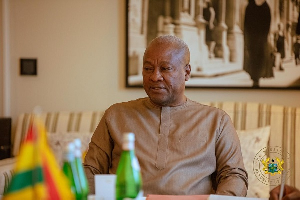A private legal practitioner, Kwame Boafo Akuffo, has criticised the decision of the High Court in Accra, ordering the Electoral Commission of Ghana (EC) to go ahead with re-collating and re-declaration of the results of five constituencies where National Democratic Congress (NDC) parliamentary candidates had earlier been declared winners.
In a write-up sighted by GhanaWeb, lawyer Boafo Akuffo pointed out a number of issues with the court’s order for the commission to re-collate and re-declare the parliamentary election results of the five constituencies.
He indicated that the commission's claim that its officers were forced to declare the initial winners was not proven before the court made its decision, which he indicated was unfortunate.
“It is my understanding that an EC officer spoke to duress as the basis for making a declaration in favour of a candidate. The side in whose favour the declaration was made denies this factual allegation. In such a circumstance, there is a clear case of dispute on the facts or contested evidence for that matter.
"The basic law teaches that in contested matters, the law does not admit of Judicial Review remedies, save in jurisdictional matters where evidence will be led on a collateral fact. Under the circumstances, the grant of an application for Judicial Review in an election dispute where allegations of duress are being contested is a flawed position,” he wrote.
The lawyer also indicated that the parties in whose favour the declaration was made should have been given the chance to defend themselves, but this did not happen.
“The allegation of duress by the EC officer is one that has hints of criminality, and thus, the court will reach a decision on same on a slight scale above the balance of probabilities in civil proceedings.
“It is for the EC, which alleges 'duress' to come before the court to raise the issue, and not the other way round. Yesterday’s proceedings were flawed. The other interested persons were not made parties to the process. This was a clear breach of natural justice,” he added.
The private legal practitioner also stated that the judgement of the court was premature.
He also pointed out issues of timing, stating that “Order 55 rule (5) 3 of CI 47 gives a respondent to an application for Judicial Review a settled time period of not less than 7 days to respond. This application was filed on the 17th of Dec 2024 and heard on the 20th. That was extremely ‘curious’.”
Read his full write-up below:
Court ruling on re-collation flawed
In every facet of life, a man is entitled to double fidelity, save in matters of the law.
The settled practice and the law require that the challenge to a declaration of a winner in an election must be by way of a petition.
The recent disputes about election declarations must be reconciled against the settled practice.
It is my understanding that an EC officer spoke to duress as the basis for making a declaration in favour of a candidate. The side in whose favour the declaration was made denies this factual allegation. In such a circumstance, there is a clear case of dispute on the facts or contested evidence for that matter.
The basic law teaches that in contested matters, the law does not admit Judicial Review remedies, save in jurisdictional matters where evidence will be led on a collateral fact.
Under the circumstances, the grant of an application for Judicial Review in an election dispute where allegations of duress are being contested is a flawed position.
It is respectfully submitted, by way of an example, that in an instance where a judge gives a judgment without taking into account some aspects of the evidence, the remedy is an appeal and not Judicial Review.
The situation, in my view, is no different from the situation where a declaration is made without taking into consideration the entirety of the "pink sheets".
The allegation of duress by the EC officer is one that has hints of criminality, and thus, the court will reach a decision on same on a slight scale above the balance of probabilities in civil proceedings.
It is for the EC, which alleges "duress" to come before the court to raise the issue, and not the other way around.
Yesterday’s proceedings were flawed. The other interested persons were not made parties to the process. This was a clear breach of natural justice.
It is necessary that the courts and lawyers walk the settled path in such contentious matters.
At the root of these mandamus applications is an attack on purported declarations. To that end, the most fundamental flaw in all of these matters is that the applicants do not have a cause of action for the declarations are ineffective, unless gazetted.
The law makes room for aggrieved parties to complain, and thus, a party can make or pray for remedies in respect of processes leading to the declaration. In such a case, a party can ask for an order directed at the EC to act in accordance with CI 127.
However, once a declaration is made, it merges into the common law. The aggrieved party must wait for his or her cause of action to accrue. There is no good in delivering premature judgment.
Finally, I draw the reader’s attention to Order 55 rule (5) 3 of CI 47, which gives a respondent to an application for Judicial Review a settled time period of not less than 7 days to respond. This application was filed on the 17th of December 2024 and heard on the 20th. That was extremely "curious".
In the absence of an application to abridge the time, the court had no jurisdiction to have heard this application.
Kwame Boafo Akuffo Esq
Box 99
Akropong Akwapim
BAI/AE
Watch a compilation of the latest Twi news below:
General News of Sunday, 22 December 2024
Source: www.ghanaweb.com

















